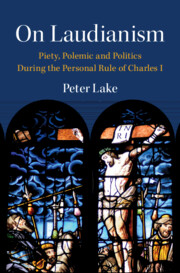Book contents
- On Laudianism
- Cambridge Studies in Early Modern British History
- On Laudianism
- Copyright page
- Contents
- Acknowledgements
- Abbreviations
- Introduction
- Part I Laudianism: Where It Came From
- Part II Laudianism: What It Was
- Holy Places
- Holy Ordinances
- Holy Times
- Chapter 17 The Feasts and Festivals of the Church, or Putting the Sabbath in Its Place
- Chapter 18 Sunday Sports and the Re/constitution of the Christian Community and the Social Order
- Chapter 19 The Sabbath and the Laudian Attitude to Authority
- Part III Laudianism: What It Wasn’t
- Part IV Laudianism and Predestination
- Part V Laudianism as Coalition: The Constituent Parts
- Conclusion
- Index
Chapter 19 - The Sabbath and the Laudian Attitude to Authority
from Holy Times
Published online by Cambridge University Press: 05 October 2023
- On Laudianism
- Cambridge Studies in Early Modern British History
- On Laudianism
- Copyright page
- Contents
- Acknowledgements
- Abbreviations
- Introduction
- Part I Laudianism: Where It Came From
- Part II Laudianism: What It Was
- Holy Places
- Holy Ordinances
- Holy Times
- Chapter 17 The Feasts and Festivals of the Church, or Putting the Sabbath in Its Place
- Chapter 18 Sunday Sports and the Re/constitution of the Christian Community and the Social Order
- Chapter 19 The Sabbath and the Laudian Attitude to Authority
- Part III Laudianism: What It Wasn’t
- Part IV Laudianism and Predestination
- Part V Laudianism as Coalition: The Constituent Parts
- Conclusion
- Index
Summary
This chapter examines the ways in which the Laudians mixed and matched the authorities of scripture, of natural law, of apostolic and ecclesiastical tradition and of the positive law of the church. Where, on the issue of church government, the Laudians pushed the claims of scripture and of apostolic precept and precedent to assert and exalt the iure divino status of episcopacy, on the Sabbath they played down the authority of scripture and of apostolic practice, while exalting the authority of the church. The result was a nuanced position which refuted the scripturalist sabbatarianism of the puritans, while allowing the Laudians to retain an account of Sunday worship exalted enough for their own purposes and perfectly compatible with their account of the power of the church to consecrate holy times as well as places.
Keywords
- Type
- Chapter
- Information
- On LaudianismPiety, Polemic and Politics During the Personal Rule of Charles I, pp. 246 - 256Publisher: Cambridge University PressPrint publication year: 2023



